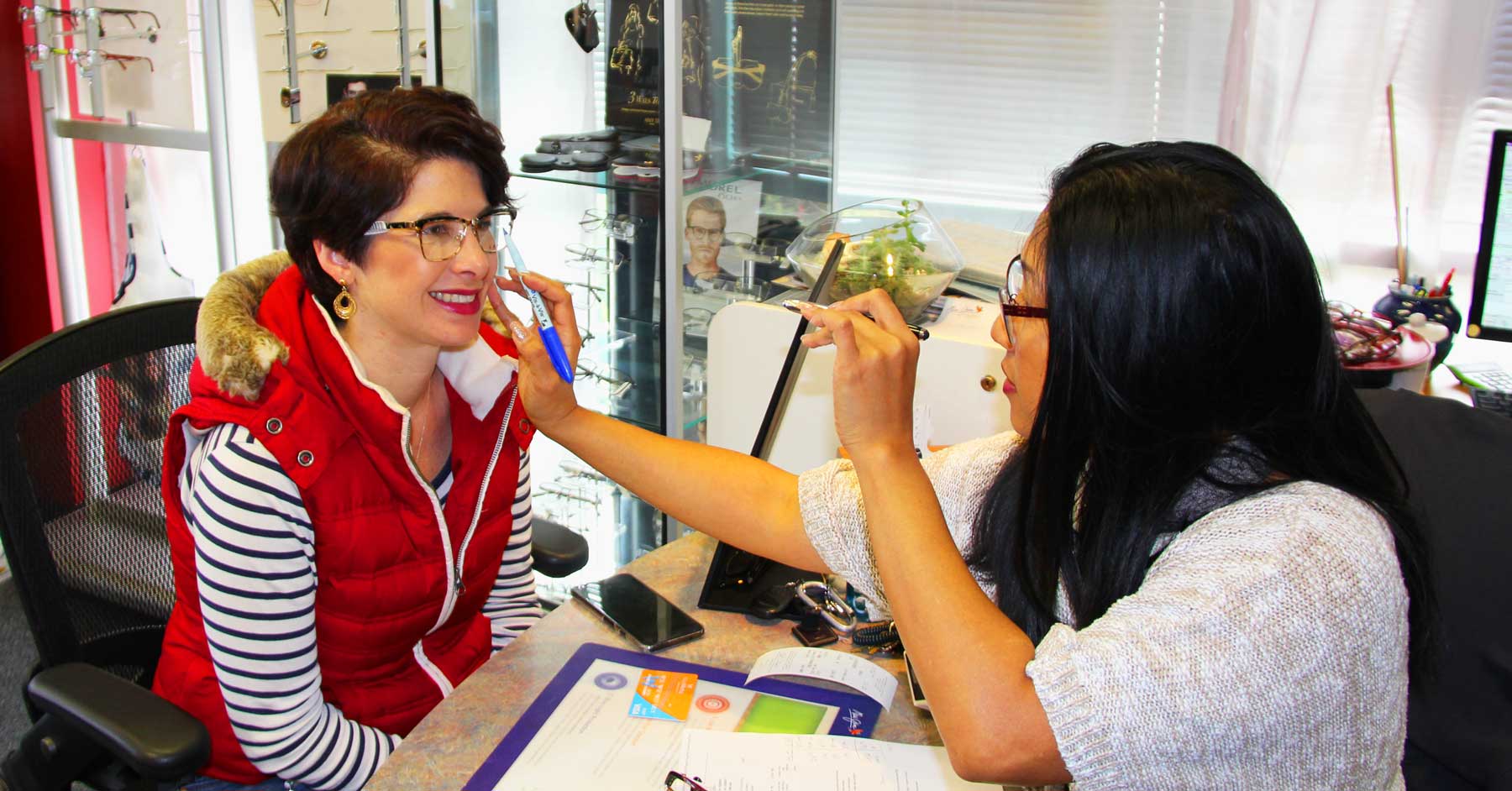Frequently Asked Questions
For Our Family Eye Care Center in the San Jose & Santa Clara, CA Area

No matter how old or experienced you are, it's a good idea to be prepared for anything. Identifying the signs and symptoms of a possible eye problem can make all the difference in your treatment plan. Depending on your condition, it might even save your vision!
We all want to enjoy healthy, perfectly clear vision throughout our lifetimes. Having accurate information is the first step in maintaining your overall ocular health. In today's world, we are at more risk than ever of developing digital eye strain, damage due to diabetes, suffering from eye allergies, and other issues. If you have recently noticed a change in your vision or how your eye feels, or if you would like to know what steps to take to improve your eye health, ask the team at our family eye care center. We are always available to answer questions about red eyes, proper vision care, dry eye treatment, corrective lenses, and more. Below are a handful of our most frequently asked questions. Take a look to see what others have asked.
-
What is the difference between an optometrist, ophthalmologist, and optician?
- An optometrist is a primary healthcare provider that specializes in assisting patients with their visual health. They perform routine eye exams and can help diagnose and treat various eye diseases.
- An ophthalmologist is a medical doctor specializing in eye conditions and performing surgery. They can also perform a routine eye exam.
- An optician is a professional who designs, fits, and dispenses lenses according to a patient's vision.
-
Why are regular eye exams important?
A routine eye exam is important, no matter your age, as it is a great opportunity for the doctor to detect any problems as early as possible. A vision test will determine your overall vision health.
-
How often should I have an eye exam?
How often you get an eye exam depends on your age and health. Children should get an annual exam to detect any changes. Patients 18-60 should have their vision checked every 1-2 years. Patients 65 and up should have their vision checked annually, or as recommended by a doctor.
-
When should I schedule an appointment?
You should schedule an appointment if you are having difficulty driving at night, experience frequent headaches or eyestrain, have burning eyes, handle chemicals or power tools, have diseases such as diabetes or hypertension, or experiencing other vision problems. Contact our doctors if you think you need to be seen.
-
What can I do to prevent dry eye?
It is important to stay hydrated, drinking enough water throughout the day. Also, you can take nutritional supplements such as Omega-3s.
-
What is digital eye strain?
Digital eye strain is the discomfort people feel after looking at a screen or digital device for longer than two hours at a time.
-
What are the common symptoms of digital eye strain?
Common symptoms of digital eye strain include blurred vision, dry eyes, headaches, and neck and shoulder pain.
-
How can I relieve symptoms of digital eye strain?
There is certain eyewear you can purchase with specialized lenses to reduce the strain, as well as positioning yourself an arm's length away from your screen, increasing the text size, and taking breaks every once in a while from the screen to relax the eyes.
-
Who can wear contact lenses?
If you need vision correction, contact lenses are a good option for just about any prescription.
-
At what age can you start to wear contact lenses?
Research and studies have been done and found that children as young as eight years of age are able to handle, care for, and adapt to wearing contact lenses. You, your child, and your eye doctor will be able to determine how responsible your child is to make the decision.
-
Can I sleep in my contact lenses?
This depends on the type of lens you purchase, as well as your general eye health, and other factors. It's best to consult your eye doctor.
-
What kinds of contacts are available?
Contacts are available in a variety of material types and have different replacement and wear schedules. From disposable contact lenses to extended-wear contacts, we can find the best fit for you and your lifestyle.
-
When should children get an eye exam?
It is recommended that children receive their first eye exam by age 9 months.
-
What are some common symptoms of vision problems in children?
1. Frequent eye rubbing
2. Sitting close to the TV
3. Headaches when watching TV/reading
4. Squinting or tilting head to see
5. Closing one eye to read or watch TV
-
Why is it important to get children's eyes checked?
Getting your child's vision checked is important as it helps detect any visual disorders and problems early on to prevent permanent developmental vision problems resulting from undetected eye problems.
-
What types of treatment options are available for children?
We offer glasses, bifocal glasses, & contact lenses.
-
Why are my eyes red?
The most common reason why eyes are red is that they are inflamed. If you notice scattered red lines throughout your eyes, it is a sign that inflammation is present.
If your eyes are red and are accompanied by intense pain or have been red for more than a few days, you should schedule an appointment.
-
What else causes red eyes?
Red eyes can also be caused by allergies, eye fatigue, over-wearing contact lenses, or common eye infections such as pink eye (conjunctivitis). Your eyes may also become red due to environmental factors such as air pollution, smoke, dust, chemical exposure, and airborne fumes.
In some cases, redness of the eye sometimes can be a sign of a more serious eye condition or disease, such as glaucoma.
-
What are symptoms that can accompany red eye?
Red eyes are often associated with the following symptoms:
- Irritation or a burning feeling
- Blurry vision
- Eye pain
- Heavy eyelids
- Light sensitivity
- Dry, itchy, or watery eyes
- Discharge
-
What is the treatment for red eyes?
The treatment of red eyes is dependent on the cause. If your eyes are red due to seasonal allergies, the treatment is typically antihistamine eye drops or oral medications. If your eyes are red due to an infection, then antibiotics might be required.
-
Does dry eye cause redness?
Sometimes, your tears don’t have the texture they should. They might evaporate too fast or your eye may not be able to make tears at all. This condition is called dry eye. If you have dry eye, you may experience redness, stinging, or a gritty sensation in your eyes.
Contact Our Vision Care Team Today!
If you have any additional questions or concerns, please feel free to
contact our vision care center to schedule a consultation. Whether you're struggling with blurry vision, dry eyes, eye allergies, digital eye strain, or another type of eye condition, our family eye care team is here to help. We offer a range of treatment options, from prescription designer glasses and
contact lenses to
LASIK eye surgery. No matter your eye issues, trust our vision care center to provide the quality care that you deserve. We're proud to offer family eye care solutions to residents across
Santa Clara,
San Jose, CA and the surrounding communities!
2555 NORTH FIRST STREET, SAN JOSE
We currently accept many different types of insurance.
HOURS OF OPERATION:
Mon, Tues, and Thurs: 10:00 - 7:00
Wed & Friday: 10:00 - 5:00
Weekends: Closed
We are closed for lunch from 1:00 -2:00 Monday through Friday




